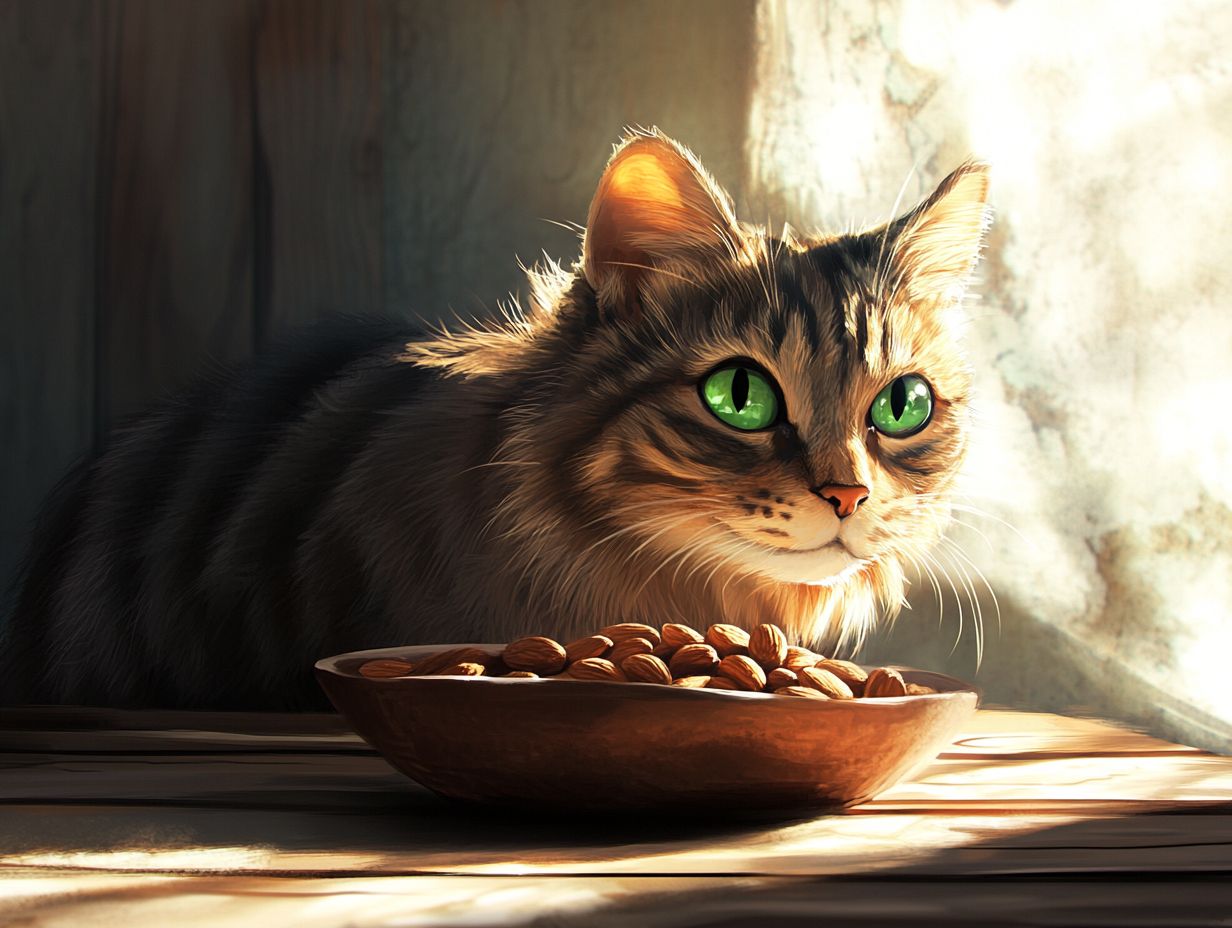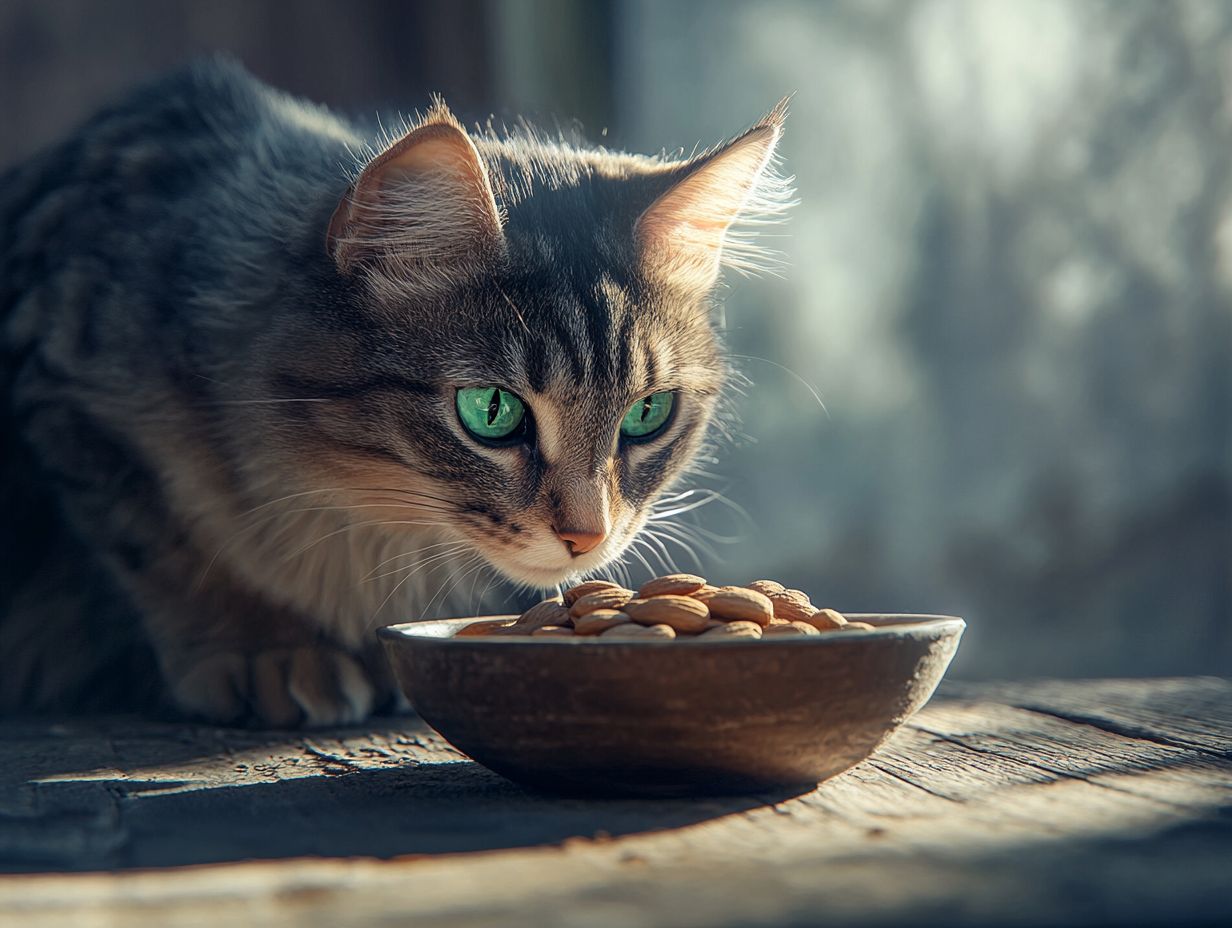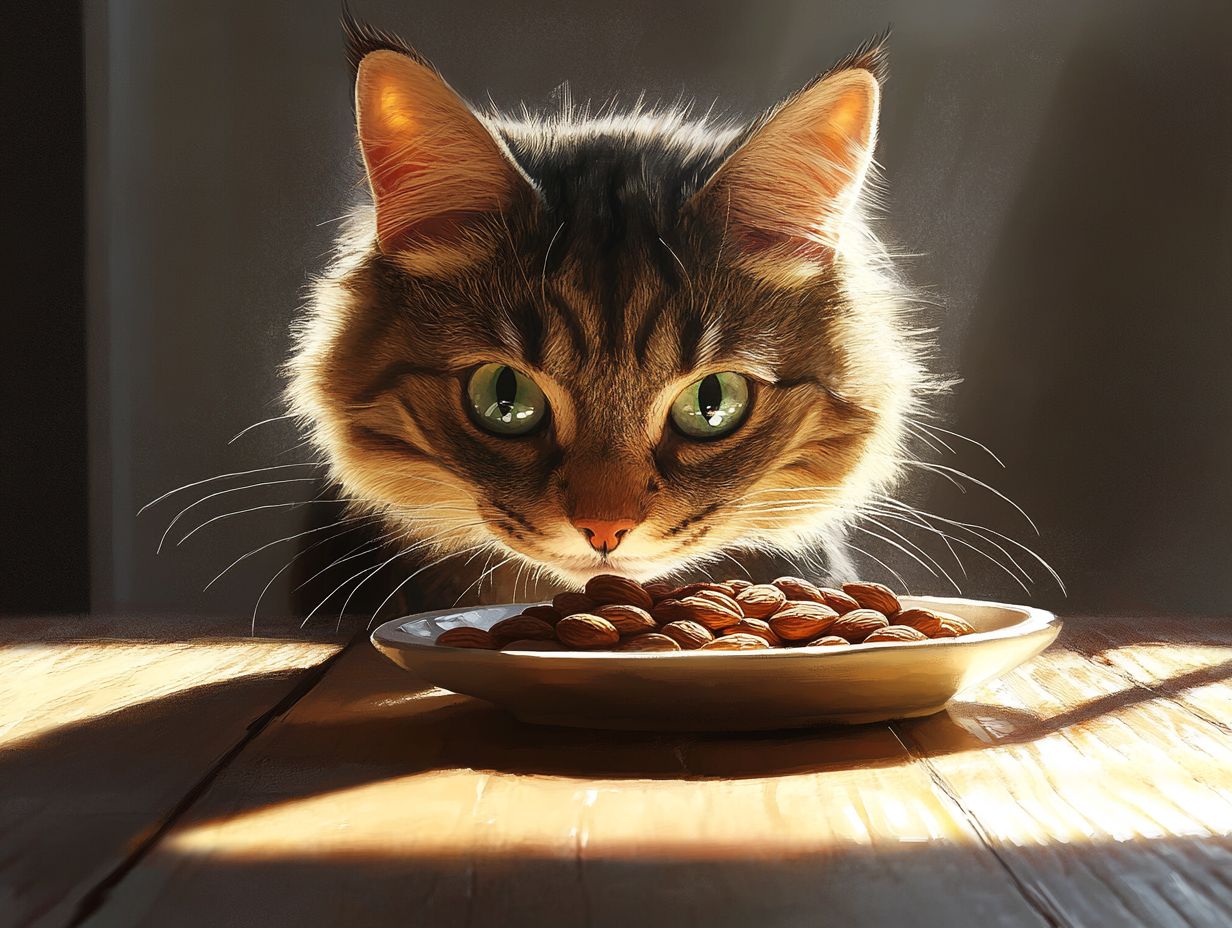Many cat owners wonder if almonds are safe for their pets. While not highly toxic, almonds pose significant health risks, including digestive issues and pancreatitis. This article will clarify these risks and provide safer feeding options.
This article explores a cat’s diet, from nutritional requirements and cat food options to common food allergies.
A burning question many cat owners have is whether almonds and other nuts, such as macadamia nuts and walnuts, are safe for their pets.
We will discuss the potential benefits and risks of feeding almonds, including sweet and bitter almonds, to cats, provide healthy snack alternatives, and outline what to do if your cat accidentally munches on some raw almonds.
Dive in to learn how to keep your feline safe while satisfying their curious taste buds!
Key Takeaways:

- Cats require a meat-based diet that meets their specific nutritional needs, and food allergies are common among felines.
- Although almonds are not highly toxic to cats, they offer minimal nutritional value and can pose risks such as choking hazards, digestive issues, and health risks like pancreatitis.
- It is best to stick to safe alternatives for feeding cats, such as small portions of cooked chicken or cat-friendly fruits and vegetables.
Understanding a Cat’s Diet
Understanding a cat’s diet is essential for their overall health and well-being, as cats require a diet rich in protein and fats. A balanced diet can help prevent health risks such as digestive issues and obesity.
Therefore, it is crucial for pet owners to seek veterinary advice and research suitable cat food options that meet their pets’ specific needs. Making informed choices in pet care can lead to healthier and happier cats, ultimately increasing their lifespan and quality of life.
Nutritional Needs and Common Food Allergies
Cats require a diet that is rich in protein and fats to meet their nutritional needs, thriving on animal-based proteins. High-quality protein sources include chicken, turkey, and fish, while some cats may develop allergies to grains and dairy. These allergies can manifest as skin irritations or gastrointestinal issues. Veterinarians recommend monitoring dietary changes and consulting them to identify specific allergies.
They may suggest alternatives such as grain-free or limited-ingredient diets to alleviate these sensitivities, or incorporate ingredients like quinoa and sunflower seeds, ensuring that your feline companion receives a balanced and nutritious diet tailored to their unique needs.
Can Cats Eat Almonds?
Opinions vary on whether cats can eat almonds, but it is essential for pet owners to understand the potential health risks associated with feeding this nut to their cats.
While almonds are not highly toxic to cats, they can pose various health risks and lead to gastrointestinal issues, which may result in serious consequences such as vomiting, diarrhea, and even pancreatitis. Therefore, it is always advisable to consult a veterinarian before introducing any new foods, including almonds, into a cat’s diet.
Potential Benefits and Risks

While some pet owners may wonder if cats can eat almonds and consider their potential nutritional benefits, the risks associated with almonds far outweigh any advantages. Despite almonds containing healthy fats and protein, their risks—including obesity, pancreatitis, and gastrointestinal distress—far outweigh any minimal nutritional benefits.
Veterinarians recommend that, instead of offering high-risk treats like almonds, pet owners should seek safer alternatives to ensure their pets receive the necessary nutrients.
Safe Alternatives to Almonds for Cats
Instead of almonds, consider offering small portions of cooked chicken or turkey as treats, or cat-friendly fruits like small pieces of watermelon or blueberries. Here are some other nutritious options:
- Coconut: Rich in medium-chain triglycerides, coconut can provide energy. Ensure it’s unsweetened and in small amounts.
- Chia Seeds: Packed with omega-3 fatty acids and fiber, chia seeds can help support a healthy coat and digestion. Sprinkle a small amount over their food.
- Pumpkin Seeds: These seeds can be a source of antioxidants and promote urinary health. Serve them roasted and unsalted for safety.
- Flaxseed: High in fiber and omega-3s, flaxseed can improve digestive health. Grind the seeds before adding them to your cat’s diet.
In summary, while cats can occasionally munch on almonds without immediate toxicity, the potential health risks make it wise to avoid them entirely. Instead, opt for safer, more nutritious treats to keep your feline friend healthy.
What to do if Your Cat Eats Almonds
If you suspect that your cat has ingested almonds, it is important to act quickly and monitor for signs of almond toxicity. Monitor your cat for at least 24 hours after ingestion, watching for symptoms such as vomiting, diarrhea, and changes in behavior. For more information, you can check out this article on whether cats can eat almonds.
Signs of Almond Toxicity and How to Respond

While gastrointestinal upset is the most common symptom of almond toxicity in cats, other symptoms may include:
- Vomiting
- Diarrhea
- Lethargy
- Loss of Appetite
- Signs of dehydration
More severe conditions, such as pancreatitis, can develop and should be monitored closely. According to the Veterinary Medical Center of New York University, pancreatitis can cause abdominal pain, which may be evident if the cat avoids having its stomach touched or excessively grooms that area.
If these symptoms are observed, it is crucial to monitor the situation carefully and seek veterinary advice immediately if symptoms persist or worsen.
Treatment for pancreatitis may include hospitalization, supportive care, and dietary changes, emphasizing the importance of recognizing these symptoms early.
FAQs about Cats and Almonds
Can Cats Eat Almonds? Are They Safe for Cats?
Yes, cats can eat almonds in small amounts. However, it is not recommended as they can be a choking hazard and may cause digestive issues.
What nutrients do almonds provide for cats?
Almonds contain protein and healthy fats, but their nutritional value may not align with the dietary needs of cats. It’s best to focus on meat-based sources for their protein intake.
Are there any risks associated with cats eating almonds?

Yes, there are several risks associated with cats consuming almonds. They can pose a choking hazard, may cause digestive issues, and can lead to pancreatitis if consumed in large amounts.
Can cats be allergic to almonds?
Yes, cats can develop allergies to almonds, similar to humans. Symptoms may include vomiting, diarrhea, and skin irritation. If you suspect your cat is allergic, it is best to avoid feeding them almonds.
What should I do if my cat eats almonds?
If your cat has accidentally consumed almonds, monitor them for any symptoms such as vomiting, diarrhea, or difficulty breathing. If symptoms persist or worsen, contact your veterinarian for further advice.
What are some safe alternatives to almonds for cats?
There are several safe alternatives to almonds for cats, such as cooked lean meats, canned tuna, and small amounts of cheese. As always, consult with your veterinarian before introducing any new foods to your cat’s diet.
Conclusion
In conclusion, while almonds may seem harmless, the potential health risks make it wise to avoid them entirely. Always prioritize nutritious foods tailored to your cat’s dietary needs, and consult your veterinarian for guidance on the best feeding practices.